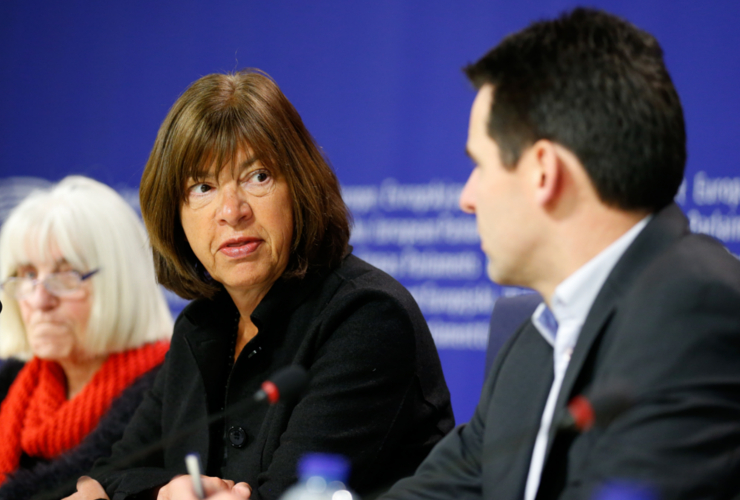Rebecca Harms is a German Green Party politician and a member of the European Parliament who has been particularly active in promoting media freedom in Turkey through her work with the Parliament’s Turkey Support Forum. Harms, who is now stepping down as an MEP, has personally observed a number of elections and journalist trials in Turkey, including those of journalists with the secular newspaper Cumhuriyet.
She spoke to the International Press Institute (IPI)’s Helsingin Sanomat Foundation Journalism Matilda Jokinen on World Press Freedom Day, May 3, in Istanbul.
IPI: What prompted you, as an MEP, to become so involved in defending press freedom in Turkey?
Rebecca Harms: I felt responsible for my vote to open up the membership negotiation process [with Turkey]. So after voting, I started to follow issues in Turkey, mainly environmental issues, given my background as a Green party member. But then the Gezi protests happened, priorities shifted: I felt I had to concentrate on core issues of democracy, like the rule of law and media freedom. I’m convinced that there is no sustainable democratic process without an independent and free media.
IPI: How much can the EU impact developments related to press freedom and human rights in Turkey?
RH: It’s difficult to say. When a country is in the kind of situation that Turkey is now under Erdoğan, the question of where it is headed is primarily answered within the country itself. Partner countries can have an impact, but they aren’t able to turn everything around.
Nevertheless, I think that the European Union and Council of Europe should use all their available instruments to show their counterparts in Turkey that what is going on is unacceptable. It must be said that, at the moment, we are unfortunately lacking decisions by the European Court of Human Rights.
I also always urge EU diplomats to be present and visible for those persons in Turkey who are now suffering from the absence of the rule of law and from unjust or fabricated accusations. I also encourage them to attend trials of not only journalists, but also of human rights activists, academics and the so-called Gülenists.
IPI: Has the EU committed mistakes when it comes to supporting press freedom and democracy in Turkey?
RH: The period after we decided to open membership negotiations with Turkey was not well used. From the very beginning, the process was a very slow one. Many chapters have never been opened, including the one on the judiciary, which we can now see is very important for democracy in Turkey.
The other important question is whether the decision to open membership negotiations was a wise one, knowing that not all member states would support the process. I am known for criticizing the EU’s lack of dedication and commitment in the process, and I criticize my own country, Germany, for giving Turkey an alternative offer of privileged partnership instead of the membership perspective.
All this was not good for the process and did not contribute to improving relations. On the other hand, of course not all the problems in Turkey today are results of mistakes or lack of political will in the EU.
IPI: Has the migration agreement between the EU and Turkey affected the bloc’s approach to human rights in Turkey?
RH: I think there is an impact, but on the other hand all current economic relationships with Turkey have an impact. The migration agreement is only one of several interests that matter. I think all EU states wanted this agreement and the EU needs this type of agreements. However, such agreements could be better implemented and better monitored when it comes to human rights and complaints of human rights violations.
IPI: Today we are celebrating World Press Freedom Day. You’ve spent many years following the situation in Turkey: Do you see a light at the end of the tunnel or will the decline of press freedom continue?
RH: I don’t know. Last week, some of the journalists in the Cumhuriyet newspaper trial with sentences lower than five years were sent back to prison. That was a real shock for me and many of my friends here in Turkey. Everyone had hoped it would turn out differently. And the day before World Press Freedom Day, the Constitutional Court rejected appeals of Ahmet Altan and Nazlı Ilıcak, concluding their right to liberty and security have not been violated during the pretrial detention. Altan and Ilıcak have already been in prison for over 1,000 days.
I don’t think we are seeing a turn for the better right now. But hopefully I’m wrong. I have to say that I very much admire the activists, politicians, lawyers and journalists here in Turkey who continue to work for democracy, for press freedom and for the rule of law in spite of all these threats. One of the reasons I always come to Turkey is that what these people are doing is so courageous and it deserves more attention and support from the EU.
Note: This interview took place in Istanbul on May 3, 2019.


